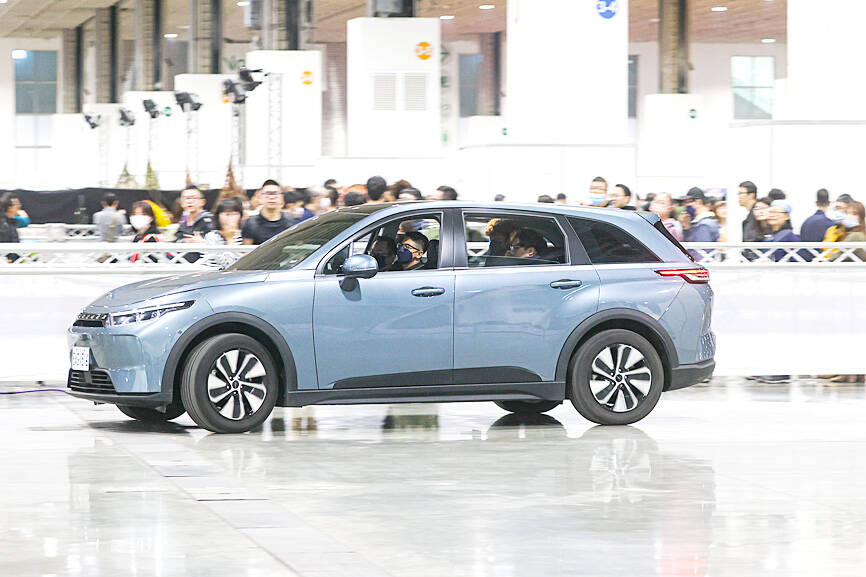Yulon Motor Co (裕隆汽車) yesterday released a positive growth projection for revenue this year, thanks to increasing shipments of its first electric vehicle (EV) model based on the MIH Open EV Platform developed by Hon Hai Precision Industry Co (鴻海精密), also known as Foxconn.
Yulon started shipping the electric sports utility vehicle Luxgen n7 earlier this year with shipments totaling 500 units in the first quarter, Yulon Motor spokesman Steven Lo (羅文邑) told investors during a virtual conference.
“In March and April, we expedited shipments to 1,200 to 15,000 units a month,” Lo said. “With higher shipments from the second quarter, we expect to complete the 9,000 Luxgen n7s in preorders by the third quarter.”

Photo: CNA
Yulon manufactures the electric vehicle while its subsidiary, Luxgen Motor Co (納智捷汽車), sells it. Luxgen has received about 20,000 n7 preorders since September 2022 and plans to accept second-wave orders from next month or June, Lo said.
Luxgen n7 is designed and based on the Model C EV developed by Foxtron Vehicle Technologies Co (鴻華先進), a joint EV venture between Hon Hai and Yulon.
“We are positive about the company’s revenue outlook, with Luxgen n7 being a major highlight of the year,” Lo said.
He said Yulon and Luxgen are discussing plans to introduce new EV models later this year, but did not elaborate.
Hon Hai last month said the new-generation Model B electric car, also designed by Foxtron, would be ready for mass production and open for preorders at the end of this year.
Regarding speculation that Yulon might distribute Chinese EVs made by BYD Co (比亞迪) and Chery Automobile Co (奇瑞汽車) in Taiwan, Lo said the company does not rule out any possibility of making vehicles for other brands, but has no substantial plans to partner with Chinese companies.
Yulon’s consolidated revenue last year expanded 6.54 percent to NT$82.12 billion (US$2.53 billion) from NT$77.08 billion in 2022, partly helped by its auto financing business operated by another subsidiary, Taiwan Acceptance Corp (裕融). Net income improved to NT$8.04 billion last year, reversing a loss of NT$469 million the previous year.
Lo said Yulon’s gross margin this year should stay at a similar level to last year when it fell slightly to 35 percent from 36 percent in 2022.

Taiwan will prioritize the development of silicon photonics by taking advantage of its strength in the semiconductor industry to build another shield to protect the local economy, National Development Council (NDC) Minister Paul Liu (劉鏡清) said yesterday. Speaking at a meeting of the legislature’s Economics Committee, Liu said Taiwan already has the artificial intelligence (AI) industry as a shield, after the semiconductor industry, to safeguard the country, and is looking at new unique fields to build more economic shields. While Taiwan will further strengthen its existing shields, over the longer term, the country is determined to focus on such potential segments as

UNCERTAINTY: Innolux activated a stringent supply chain management mechanism, as it did during the COVID-19 pandemic, to ensure optimal inventory levels for customers Flat-panel display makers AUO Corp (友達) and Innolux Corp (群創) yesterday said that about 12 to 20 percent of their display business is at risk of potential US tariffs and that they would relocate production or shipment destinations to mitigate the levies’ effects. US tariffs would have a direct impact of US$200 million on AUO’s revenue, company chairman Paul Peng (彭雙浪) told reporters on the sidelines of the Touch Taiwan trade show in Taipei yesterday. That would make up about 12 percent of the company’s overall revenue. To cope with the tariff uncertainty, AUO plans to allocate its production to manufacturing facilities in

COLLABORATION: Given Taiwan’s key position in global supply chains, the US firm is discussing strategies with local partners and clients to deal with global uncertainties Advanced Micro Devices Inc (AMD) yesterday said it is meeting with local ecosystem partners, including Taiwan Semiconductor Manufacturing Co (TSMC, 台積電), to discuss strategies, including long-term manufacturing, to navigate uncertainties such as US tariffs, as Taiwan occupies an important position in global supply chains. AMD chief executive officer Lisa Su (蘇姿丰) told reporters that Taiwan is an important part of the chip designer’s ecosystem and she is discussing with partners and customers in Taiwan to forge strong collaborations on different areas during this critical period. AMD has just become the first artificial-intelligence (AI) server chip customer of TSMC to utilize its advanced

While China’s leaders use their economic and political might to fight US President Donald Trump’s trade war “to the end,” its army of social media soldiers are embarking on a more humorous campaign online. Trump’s tariff blitz has seen Washington and Beijing impose eye-watering duties on imports from the other, fanning a standoff between the economic superpowers that has sparked global recession fears and sent markets into a tailspin. Trump says his policy is a response to years of being “ripped off” by other countries and aims to bring manufacturing to the US, forcing companies to employ US workers. However, China’s online warriors